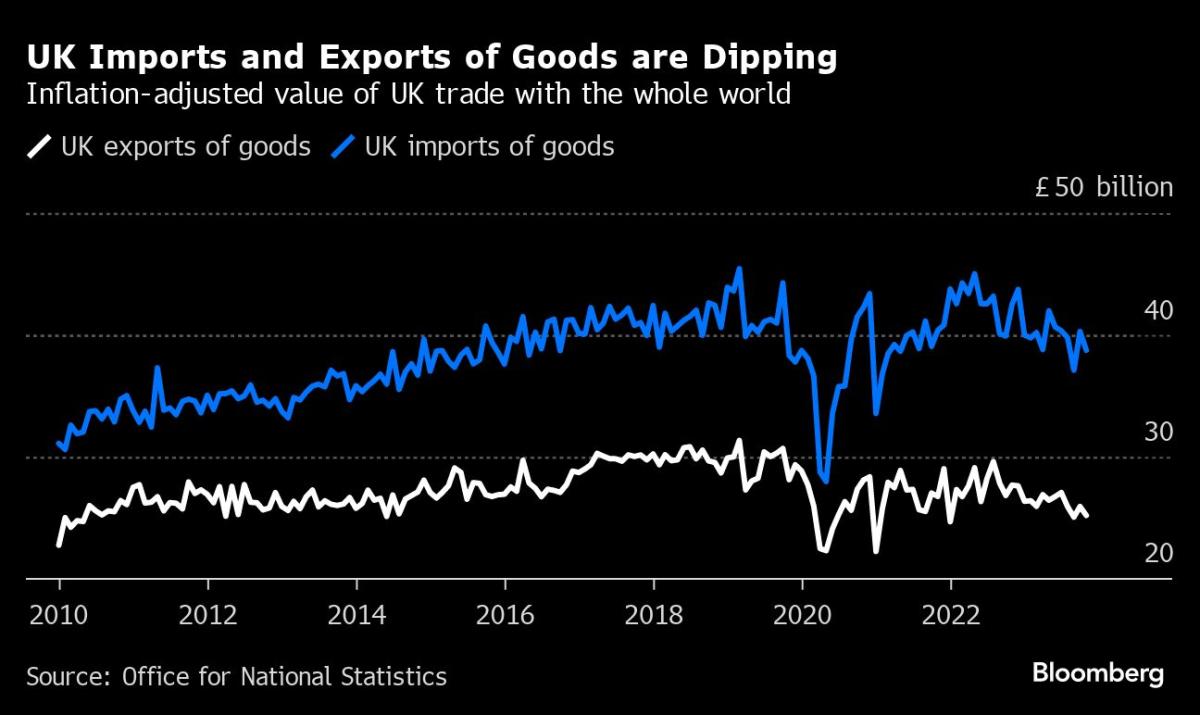Most Read from Bloomberg
While UK government officials are trying to play down the impact on British industry, especially car-makers, one critic is calling it “embarrassing” for the country’s post-Brexit trade policy that it was unable to reach a deal even with a close ally.
Forming closer trade ties with countries outside the EU was touted by Brexiteers, including Prime Minister Rishi Sunak, as a key benefit of leaving the bloc. But so far the UK has only signed new bilateral free-trade agreements with Australia and New Zealand, and those deals have been criticized by MPs and farmers alike.
The failure to secure an extension on so-called rules of origin provisions with Canada, even after last-ditch talks between UK Trade Secretary Kemi Badenoch and her Canadian counterpart Mary Ng on the sidelines of the World Trade Organization conference in Abu Dhabi at the end of February, underlines just how difficult it will be for the UK to boost its tariff-free trade with non-EU markets.
It may also be a sign of deepening rifts in the ruling Conservative Party, which is lagging the opposition Labour in polls ahead of a general election expected later this year as discord against Sunak grows.
While the EU is still the UK’s largest trading partner, and Labour has vowed to deepen that relationship in an effort to boost the economy if it wins a general election, negotiators are finding out first-hand that the UK’s closeness to the EU may alienate it from other trading partners.
“We may have allies, but we all have interests as well,” said David Henig, a director at the European Centre for International Political Economy. He added that there was “a lot of naivety” in government trade circles at the time of Brexit, and that it was “embarrassing” that the UK had not been able to reach a new trade deal with Canada.
The lapse of the rules of origin provisions on Monday comes after negotiations on a wider improved FTA between the UK and Canada were “paused” by Badenoch earlier this year. At a time of infighting in the Conservative Party, the trade secretary is seen to be a potential successor to Sunak. While she has sought to distance herself from the plotting against the prime minister, Badenoch has raised eyebrows with a spate of social media interventions perceived by some to be undermining him.
A person close to Badenoch said having an independent trade strategy outside of the EU meant being prepared to play hardball, and that the trade secretary was willing to put her foot down. This position is likely to go down well with the right of the Conservative Party, many of whom voted for Brexit in order to increase UK sovereignty and who would be reluctant to relinquish control through trade deals.
Several people with knowledge of the matter said in the run-up to the pause in negotiations, UK officials were becoming increasingly reticent to address the broader deal as they were focused on getting an extension to the rules of origin, which were a hangover from the UK’s membership of the EU.
But two people close to Canada’s negotiating team said the UK was offering nothing in return. Canada wanted a firm deadline on the rules of origin in order to incentivize the UK to prioritize the broader trade deal. The two countries have a strong relationship, but that doesn’t mean Canada can give things away for free, said one Canadian official who asked not to be named as the discussions are private.
Rules of origin measures affect several industries, but in the context of UK-Canada trade they are particularly vital for the UK’s car manufacturing sector. Canada was the eighth largest export market for auto firms last year, with exports totalling almost £700 million ($883 million).
Exporters that would previously have been able to trade tariff-free under rules-of-origin provisions will now be slapped with a 6.1% levy, or around £3,000 per vehicle, according to the UK’s Society of Motor Manufacturers and Traders.
“The potential tariff liabilities will be significant,” SMMT chief executive Mike Hawes said in a recent letter to Parliament’s Business and Trade Select Committee.
The breakdown in negotiations was mostly due to Canada’s insistence on the UK loosening its food safety regulations, according to several people familiar with the matter.
Canada’s agriculture and food processing market is geared toward exporting to the US, where practices such as chemical carcass-washing and hormone-injected beef and pork are commonplace. In the EU, and the UK by virtue of its former membership of the bloc, such practices are banned.
Canada had been hoping that the UK’s need to extend the rules of origin provisions would lead to some flexibility on carcass-washing, if not growth-treated beef and pork. But according to people with knowledge of the UK position, this was a red line the government was not willing to cross.
“Canada’s decision not to roll over these rules of origin will increase the cost of trade and hurt businesses on both sides of the Atlantic,” the Department for Business and Trade said. “The UK government remains ready to work with Canada to find a solution that works for both countries, but we won’t accept rowing back on the current terms.”
Most Read from Bloomberg Businessweek
©2024 Bloomberg L.P.
